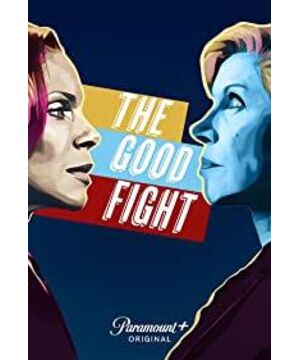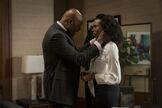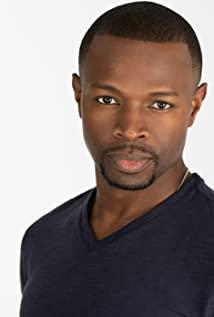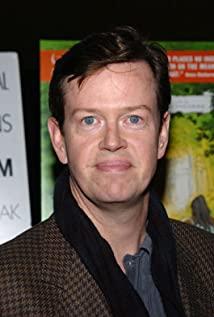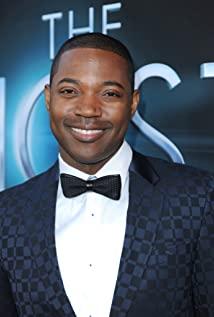Spin-offs are a fairly common and mature product in the American television industry. With the help of the accumulated resources and attention of the original play, the derivative play tells the story of the character's past and future through a different perspective from the original play, or analyzes and discusses the theme in another way.
When it comes to the relationship between Alicia and Peter in The Good Wife, creator Robert King said something that still stands out to me: " This show isn't about love, it's about power (The show is about power). not about love, it's about power)".
The whole proud series has always revolved around the concept of "power". Whether through marriage, gender relations, workplace, or officialdom, screenwriters have always shown the "power magnetic field" between different fields and different groups of people. In my opinion, Battle of the Bone is a further elaboration of the concept of power by the screenwriter on the basis of The Good Wife.
In the third episode of "Best Fight", the screenwriter used Adrian's mouth to give a succinct definition of power "Take it from someone and give it to someone".
Seizing power and empowerment, two sides of the same power.
In the concept of political law, power and right are two strictly differentiated concepts. Power is related to domination, and rights are related to protection. Power is a sword and power is a shield. Power grows with one another, and power grows together. Power is limited, and the conferment of power by one party must be accompanied by the deprivation of the power of the other party. The cruelty of power is precisely in this give and take, and the hierarchical difference in the status of the two sides is frozen.
Zweig once wrote: "History behaves in a way that is neither moral nor immoral. It neither punishes nor promotes good. It is based on power, not justice, and it often attributes victory to possession. Powerful people."
Although power is a political concept, it exists not only between regimes, but also among individuals. In other words, the game of rights and interests among individuals is the miniature embodiment of the game of political regimes.
Regarding the power comparison between individuals, Canning described a scene to Alicia in the seventh season of "The Good Wife": When two people accidentally bump into each other, one of them will subconsciously apologize and say "Sorry", while The other party will bluntly accuse the other party of "watching it". Canning believes that Alicia is always the one who apologizes, and is always the one who surrenders his power in both positions, so he educates Alicia to be the one who holds the power strongly. Bravely say "watch it!".
Alicia's story in "The Good Wife" is a process from a victim to a perpetrator, which is actually a process of seizing power. The changing process of this power balance can be seen in her relationship with everyone.
The power shift between Alicia and Peter begins with a slap in the backstage hallway at the press conference for the first episode. When Alicia's political image and economic control gradually surpassed Peter's, she became the one who controlled the initiative of the relationship between the two; and when she had the evidence of Kurt's infidelity, the power inclination under the unequal information made her By switching from a high position in his relationship with Diane to taking control of his own life. She did gradually become the one who learned to say "Watch it".
If "The Good Wife" is a horizontal power game between individuals, then "The Good Wife" is a vertical and multi-layered power battle. It is not difficult to see the ambition of the screenwriter to pay tribute to the complex social power game group portrait of "The Wire".
The proud series has never lacked profound reflection on real social phenomena. "War of the Bone" explains how power works in these different levels of workplace individuals, groups, and state institutions.
From the perspective of the most micro-individuals, since Diane joined the new law firm, a new round of power distribution within the law firm has begun. Barbara once tried to use Lucca to restrict Diane, but in the end Diane, with the resources of his many years of partners and solid case handling ability, got his deserved power position in the law firm, rose from the trough, and got back to the law firm The position of the man at the helm.
The power game between groups is even more subtle in the play. In the third episode of "Bold Fight", when everyone thought that Julius voted for Trump, at first they applauded him for the benefit of the law firm, but in fact they gradually alienated him. When the final scene was frozen in Julius sitting in the office, watching the people coming and going looking at him with strange eyes, we certainly saw the writer's mockery of Trump, but at the same time we saw the "right majority" Some kind of "oppression" of minority dissent. A question worthy of consideration and caution about the effects of group power presented here is: Is "truth" still an absolutely correct behavior when it is imposed on each individual in a way of absolute power? Where is the line between majority power and majority tyranny?
In the depiction of the operation of power in the bureaucratic system, "War of the Bone" also shows a strong sense of hierarchy, which is also where I have seen the shadow of "The Wire" several times. Mike returns to the spinoff and continues to cause all kinds of trouble for everyone in the law firm. He put false suspicions on everyone in different ways, always trying to find out the illicit business relationships that existed in the law firm. He thinks he is upholding justice, but in fact his own actions are the greatest injustice. Holding the banner of justice and turning hands into rain in the state institutions, the abuse of power is vividly reflected in this character. At the end of the fourth episode, he even used machine-generated misinformation as Maia's troll, sarcastically.
The proud drama has always shown the vigilance and prevention of the proliferation of state power. The show of the state's public rights infringing on private rights in the play is never deliberate but has considerable weight. "The Good Wife" includes monitoring of Alicia, and "The Good Wife". There have been cases where the government restricted citizens' exercise of freedom of speech under the First Amendment to the Constitution. The battle between private power and public power is a classic theme in Aogu drama. This battle is believed to continue throughout the series.
Power has such an important place, but its operation between society and the people in it is often implicit. It is like an "invisible hand" that governs the distribution of various resources and benefits. Everyone is in it, so it is always impossible to see the whole picture. By outlining the power struggles at every level, the series allows people to recognize and reflect on how these powers are governed. Only by knowing power can we use power better.
One of the great features of Aoba is that it always asks more questions than answers, and always has more open options than conclusions. Even if the screenwriter has a certain value orientation, it always presents different values and ways of thinking, allowing people to compare and choose. There is no right answer here, only different standpoints.
Going back to the title itself, The Best of Bone, it depicts the battle that each of us is in, tangible or intangible. In it, weakness and moral perseverance have no firm foothold, and only power gained through wisdom and strength is a powerful weapon. As Diane said to Alicia in Season 4: "No one is here to make it comfortable for you. No one is here to appreciate your moping. ". Also as Lucca said to Maia in the first episode "Harden yourself. Keep your head down and keep working."
Everyone's savior is only himself.
We cannot choose to fight, we can only choose to fight.
There is little sweet warmth in the proud drama, and it never gives people the fantasy of life as good as chicken soup. There are only extremely cruel challenges that must be faced here, and there are only individuals who are riddled with holes but still have to move forward with pain.
There is no grouping and frustration among the underdogs, no cynicism among the underdogs, each of whom is like a hero with a long sword pointed straight ahead, alone or side by side. Their previous tacit understanding was more like the friendship between knights, standing on their respective mountaintops, looking at each other and smiling sympathetically.
Success and failure is not only the history of heroes and great men, but also the past, present and future of each of us.
The world of yesterday may have collapsed, the world of the future is unpredictable, and the long battle has already unfolded.
Pick up the frailty and wipe away the tears. Always have the courage to overthrow and start over, and always have the arrogance to fight again with a sharp blade in hand.
THE END
View more about The Good Fight reviews


